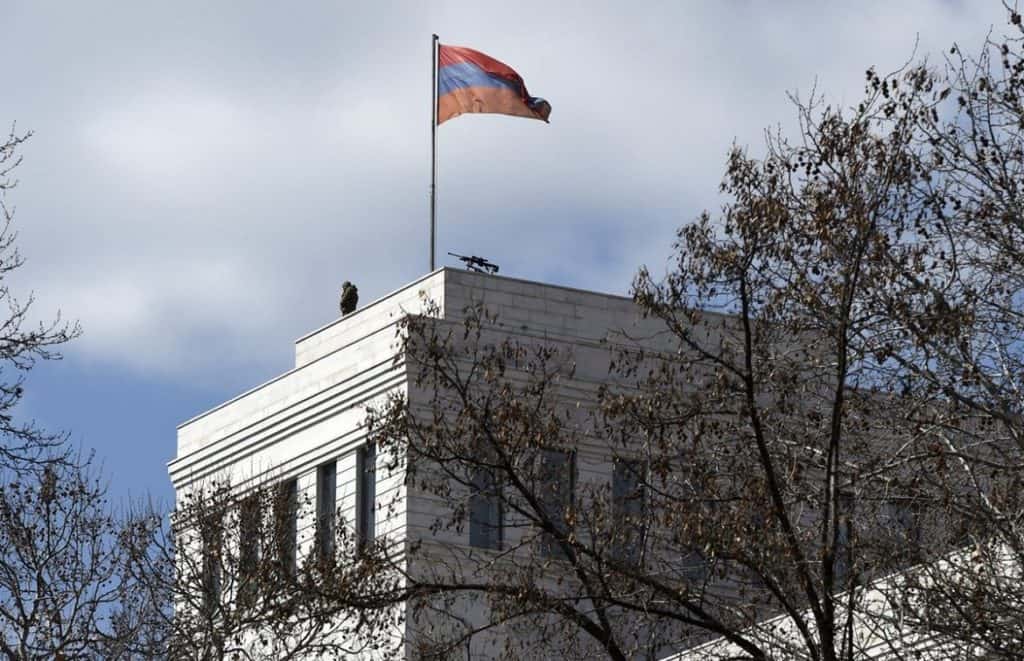By David Davidian
Soldiers win battles; diplomats win wars. Genocide can be committed, but often responsibility is avoided by diplomatic prowess. The key in each instance is diplomatic skill. Twenty-five hundred years ago, Sun Tzu stated in his Art of War, “Victorious warriors win first and then go to war, while defeated warriors go to war first and then seek to win.” The Second Karabakh War was not just a military catastrophe for Armenia, it was also a diplomatic defeat of unprecedented proportions.

Armenia finds itself in a self-made situation and is running out of diplomatic options. With thousands of Azerbaijani soldiers violating Armenia’s border, Armenian Prime Minister Pashinyan has not only inherited a national problem but he has made it much worse. Modern Armenian diplomacy has not been known for its courage or wisdom. Since Pashinyan has come to power in a populist campaign, many ministries have been gutted. Some ministers have been replaced several times over since 2018, and certainly none are the best and brightest available. The Director of the National Security Services has been replaced five times. The result of this replacement-on-a-whim is the lack of functional continuity, which was especially disastrous coming just before, during, and after the Second Karabakh War. Recently, Pashinyan’s friend, Ararat Mirzoyan, former speaker of the Armenian Parliament, was assigned the role of foreign minister. Mirzoyan has no experience in diplomacy or negotiation, allowing one to conclude his function is to rubber-stamp the policies of Prime Minister Pashinyan, who also has no experience in diplomacy or negotiation.
Pashinyan has a history of categorizing the Nagorno-Karabakh stalemate as a yoke around the economic progress of Armenia. His recent re-election as Armenian Prime Minister was based on promises of post-war economic expansion, and of course aided by the immense use of administrative resources. Accumulated evidence allows one to rank high the hypothesis that last autumn’s Armenian defeat was engineered. Though some would consider this hypothesis as conspiratorial, there is mounting evidence that the Armenian leadership believed that only by losing a limited war could they convince Armenians to justify relinquishing land to Azerbaijan. Based on openly available sources, and applying critical thinking techniques, it is not unreasonable to conclude that Pashinyan’s policies have failed to such an extent that he has painted Armenia into a corner:
1 – Pashinyan’s badmouthed Moscow’s-led Collective Security Treaty Organization CSTO and arrested its Secretary-General, Yuri Khachaturov, for events in Armenia in 2008, when Pashinyan was jailed. This arrest angered Moscow. Armenia is a member of the CSTO, and when it came time for a possible CSTO response to the Second Karabakh War and post-ceasefire Azerbaijani aggressive actions, the CSTO, not surprisingly, remained neutral.
2 – Pashinyan appeared to have engaged in pro-Western actions and rhetoric, yet each act created no reaction from Western capitals. Populist Pashinyan went after a select group of oligarchs, exacerbating Armenian’s social fabric by favoring some and punishing others.
3 – The unwritten rules of military alliances demand that members must take it upon themselves to engage a threat to their own state, then request an allied response. Pashinyan promising a post-war economic boom, although somewhat muted as of late, precludes escalating skirmishes with Azerbaijan, further negating a CSTO response. If another war starts under Pashinyan’s watch, his claim of legitimacy will be seriously undermined. Thus, a military lever of Armenian diplomacy is lost. Further, it is not known if Turkey has threatened Armenia militarily and under what circumstances. One would assume even in the crudest democracy, the status of these national threats would be made public. However, Pashinyan’s hold on power is based on an illusion of a non-existent “peace dividend.”
4 – Even if Armenia’s defeat in the Second Karabakh War wasn’t engineered as hypothesized, Pashinyan and his team appeared to have misread what defines end-of-hostilities when one side hasn’t unconditionally surrendered. Technically, Azerbaijan was not fighting Armenia per se, but rather the Armenians of Nagorno-Karabakh. Armenia’s defeat was not secured with an unconditional surrender, because Azerbaijan is not exercising sovereignty over core Armenian-inhabited Nagorno-Karabakh. The Nagorno-Karabakh Armenians run their local affairs. With Armenia lacking professional statesmanship, with ministries complete with friends and lackeys of Pashinyan, one could have predicted an Armenia having been out-classed diplomatically, with increasingly limited options. Azerbaijan still holds Armenian POWs and civilian hostages and is using them to extract more concessions from Armenia. Pashinyan has periodically announced the concession of Armenian villages to Azerbaijan, not understanding such accommodation means little to Azerbaijan but will destroy the lives and families of Armenians, psychologically undermining the social fabric of Armenians.
5 – On July 14, 2021, Azerbaijani President Aliev stated (paraphrasing) If the war continued, we would have suffered more losses. We could have faced difficulties in liberating Kelbajar and Lachin due to the coming winter. Both Lachin and Kelbajar were regions conceded by Armenians, the latter with almost no fighting. These regions were of strategic value to Armenians, both militarily and culturally. Pashinyan must have been aware of the Azerbaijani military situation as spelled out by Aliev, post-factum. Last autumn’s concessions allowed Azerbaijan, today, to harass Armenian border villages, block roads, etc. One is forced to ask what military or diplomatic logic was used to concede these areas? Perhaps a moot point, even if engineered, but the result was an immediate loss of Armenian diplomatic and negotiating options.
“The first way to lose a state is to neglect the art of war; the first way to gain a state is to be skilled in the art of war.” – Niccolo Machiavelli
Author: David Davidian (Lecturer at the American University of Armenia. He has spent over a decade in technical intelligence analysis at major high technology firms. He resides in Yerevan, Armenia).
Image Credit: Asatur Yesayants
This analysis is part of a two-article series. Read also: Azerbaijan’s Limited Diplomatic Options







